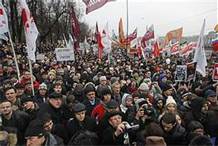
Russian Reformers Old and New
The demands of the Russian reformers seemed reasonable enough to me. They wanted the Russian government to stop being so autocratic and function more like a republic. They wanted their civil rights guaranteed. They wanted a more democratic police and military, abolition of religious and ethnic discrimination and finally, free and fair elections. Who could argue with any of that?
Actually, those were the demands of the 1917 Petrograd Soviet. The Petrograd Soviet was formed in opposition to the Provisional Russian Government after the abdication of the last Russian Tsar, Nicholas II. This Soviet comprised the Left-wing Russian political parties: Bolsheviks, Menshaviks, Social Revolutionaries and Anarchists. The problem was none of these parties could agree with one another about exactly how to implement any of their demands and in the chaotic atmosphere of Revolutionary Petrograd (St. Petersburg), the party that was willing to compromise their original principles in order to seize power won the day. They triumphed over both their socialist brothers as well as the more conservative opposition. Thus, Russia was taken over by the Bolsheviks who, as we all know, implemented none of the Soviet’s demands though they paid lip service to all of them.
Nearly a century later, Russia has a new reform movement which came together from a variety of different groups in response to irregularities in the 2011 legislative process. Its demands are less ambitious but eerily similar to the demands of 1917. Aside from wanting the results of the 2011 parliamentary elections overturned, the 2012 reformers’ main goal echoes the cries of the Socialist parties of ninety-five years ago. Their name “For Fair Elections” says it all.
And what, if anything, have these new Russian reformers achieved? Well, they’ve gotten a lot of international press and many Western leaders have espoused their cause. Hillary Clinton, for example, made several official statements supporting their demands. But concrete outcomes remain a bit thin on the ground. The 2011 elections were not annulled and Vladimir Putin went on with his United Russia party to sweep to victory in 2012. Only this month, new laws have been passed in Russia setting boundaries on protests and handing out stricter penalties for out-of-bound actions. Many protestors’ homes have been raided. People have gone to jail.
So why weren’t they more successful?
For one thing, one should never underestimate the collective Russian memory of what happened the last time the reforming Left took to the streets in great numbers. Well-intentioned as many of the revolutionaries may have been back in 1917-1918, the fact is the situation got completely out of control and Russia fell under the sway of a party that was far more ruthless and tyrannical than the Tsarist regime that preceded it.
For another thing, let’s not over-estimate the numbers. The 2011-2012 protest movement was by and large a Moscow phenomenon. Moscow, in case any of you didn’t know, is not Russia. She doesn’t even pretend to be. A former Russian student of mine, a young woman who had grown up in a large, provincial Russian city, but now lives in the capital, proves my point. When in a recent e-mail, I asked her what was going on both in her own life as well as in Russia at large, she answered loftily. “I don’t know anything about what’s going on in Russia. I live in Moscow.” The Muscovites, unfortunately, conservative and reformer alike, often holdthe rest of the country in a kind of contempt. They consider it backward and embarrassing. Likewise, there is a profound distrust on the part of the Russian provinces of what happens in the capital. The 2011-2012 protests were not a strong nation-wide movement.
Finally, Russia has never had a unified opposition. They did not have it in 1917 and they do not have it now. Parties agree on what is wrong, but quarrel with each other over what to do about it. While in 2012, there is no war, no food shortage, no hyper-inflation to weaken an already tottering state.Putin’s government is strong.Oil and gas money continues to flood in. More things are available to the average Russian than ever before. It would take a total collapse of oil and gas prices, for one, before the country as a whole might start listening to the “For Fair Elections” movement. And maybe not even then. After all, it’s easy to support revolutionary change when it’s in someone else’s country, but when the chaos and hardship are going to be your own, it’s harder to get buy-in.





Thank you Linda, I laearned more about Soviet elction problems than I ever did before. You should be the evening news commenttor. Eat your heart out, Diane Sawyer.
Did I ever tell you the one setence i know in Russian? “Znat nee Znayu, vyedatne
vyedayu.” I think it means “I don’t know anything about it.” which is handy when you are picked up by immegration.
But it probably means I don’t know what I’m saying.
Dosvyedanya. Jacquie Dearborn
But wanna say that this is very helpful , Thanks for taking your time to write this.
My pleasure. I’ll be blogging from Spain tomorrow and France next week.